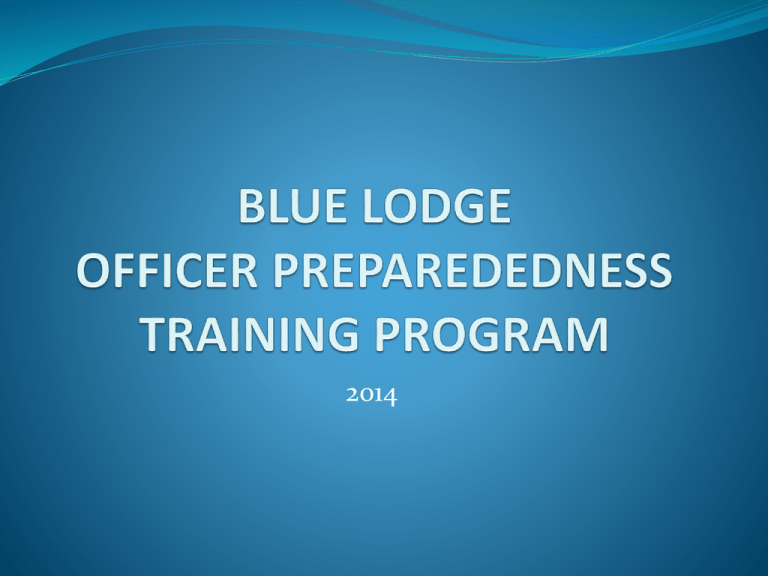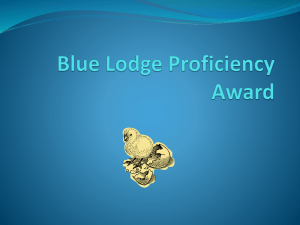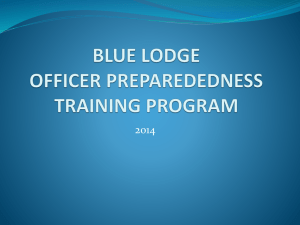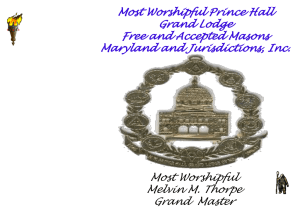Lodge Budget Training - Educational Resources
advertisement

2014 Source: Masonic Leadership Training Manual. Grand Lodge of Florida 2010 Edited for use for the Grand Lodge of Alabama, by the Education and Public Relations Committee Grand Lodge of Alabama Prepared by Bro. K. A. Carpenter Reviewed by the Education and Public Relations Committee 2014 Program Objective The objective of this training presentation is : To provide current subordinate Lodge officers, and potential Lodge officers with a foundation of budget and financial planning THE NEED FOR A BUDGET Preparing a Budget: One of the least understood and most feared principles of management Budget: a road map for planning programs and activities of your Lodge for the year. A Lodge budget does not include charge accounts, credit cards, or overdraft capabilities. Simple Principle: Cash Money in and Cash Money out THE NEED FOR A BUDGET (Cont.) Budget process: Must start from scratch every year, starting with goals and objectives. Establish an active Budget Committee (officers and selected members [e.g.. accountants] to make budget decisions supported by the Lodge membership. Involve the Membership: Publish budget reflecting revenue, spending, and savings in Lodge official communication (Trestle Board, etc.). Distribute copies at first stated communication. Discuss resources required for implementation of budget, and secure approval of budget from your membership thereby establishing the plan as their spending plan. HOW TO STAY WITHIN YOUR BUDGET It is vital to the integrity of your budget to monitor your expenditures to insure that your spending is within the authorized budget. Start of year: Ask sec. and tres. to submit a year-to-date statement of the total amount of revenue received , and a list, by budget categories, of all expenditures. Compare expenditure list to approved budget for picture of your fiscal condition. HOW TO STAY WITHIN YOUR BUDGET If your are in the red, say NO to further spending If your are in the black, continue spending plan Plan Ahead: Be aware early dues income may not be equal to later expenditures Handling Unexpected Expenses: Vital unanticipated expenditures cannot be delayed. Insure that expenditures are in accord with spending plan and the wishes of the Membership of the Lodge. Budget & Finance Comm. are to review existing appropriations and expenditures and make recommendations to Membership. HOW TO STAY WITHIN YOUR BUDGET Budget Limits: Each budget category must have limits with adjustments made in categories that are underexpended, making up those deficient areas due to unexpected expenses or unforeseen circumstances. Insure limits are reasonable and carefully monitored. HOW TO STAY WITHIN YOUR BUDGET Authorized Expenditures: Insure budget plan and expenditures conform to Gd Ld requirements and to your budget approved by your membership. Each Master must insure expenditures are only those that are authorized. Review Gd. Ld. Constitution & Edicts, and Lodge By-laws to insure expenditures are consistent with the letter and intent of said laws. 2014 FOR _________LODGE NO ___ FOR THE YEAR _____________ SIMPLE SAMPLE BUDGET GENERAL INCOME General Income: Estimate Annual Dues (Members X dues) (Total members less dues exempt) Petitions (number X initiation fees) Affiliations (number X fee) Interest of Life Membership Acct Actual SIMPLE SAMPLE BUDGET (Cont.) • ESTIMATE ACTUAL Interest on Bldg. fund / Holding Co. Accts Newsletter Advertisements • TOTAL GENERAL INCOME _____________ SIMPLE SAMPLE BUDGET (Cont.) GENERAL EXPENSES ESTIMATE ACTUAL Annual Lodge Rent Grand Lodge Assessment (Members X per capita) (Total members less per capita) Candidate Costs (Apron, Booklets, etc. Secretarial Supplies SIMPLE SAMPLE BUDGET (Cont.) GENERAL EXPENSES ESTIMATE ACTUAL Lodge Supplies Building Maintenance Lodge Improvements Newsletter Printing Newsletter Postage • Total General Expenses : ____________ • Net: ____________ • Date of Approval: ____________ LODGE BUDGET INCOME SHEET Dues $ ________________ Fees $ ________________ Interest (Savings) $ ________________ Other Investments $ ________________ Fundraising Events $ ________________ Other Income $ ________________ Balance from Prior Year $ ________________ Total $ _____________ Total Carried Forward to Next Year $ _________________ Budget: Expense Sheet Grand Lodge Per Capita Dues $ ___________________ Taxes $ ___________________ Insurance $ ___________________ Postage (Due s Notices Etc. / News Letters) $ ___________________ Office Supplies $ ___________________ Salaries & Wages $ ___________________ Utilities / Dumpster / Internet $ ___________________ Regular Lodge Maintenance (Lighting / ,Heat-Air filters, kitchen) $ ___________________ Emergency Lodge Repairs (Roofing, Heat-Air, Water Damage) $ ___________________ Supplies from Grand Lodge & Masonic Suppliers (Aprons, etc.) $ ____________________ Budget: Expense Sheet (Cont.) Charitable Expenses (Standard Annual Allowance) $ ____________________ Charitable Expenses (Emergency Donations to distressed Bro. or Lodge) $ ____________________ Dinners (Foods, Plates, Napkins, Cups) $ ____________________ Regular Lodge Special Activities $ ____________________ Regular Lodge Special Activities $ ____________________ TOTAL EXPENDITURES $ ____________________ TOTAL EXPENDITURES OVER INCOME (To be raised) $ _____________________ LODGE BUDGET WORKSHEET / LODGE ACTIVITY BUDGET Postage $ ________________________ Invitation Printing Lodge- Provided Food $ ________________________ Decorations Incidental Expenses Total (multiply by anticipated number in attendance) Total Expenses for Activity $ ________________________ $ ________________________ $ ________________________ $ ________________________ $ _________________________ HOW TO ORGANIZE THE FINANCIAL RESOURCES OF YOUR LODGE Every organization needs an adequate flow of funds to support is goals and objectives. Can you accomplish your goals and objectives with present resources alone? The delay of establishing a firm financial foundation creates a larger problem in succeeding years. Establish financial goals, even if raising dues is necessary. If given the facts, your Brothers will respond in a positive manner. To establish the Lodge on a path of financial stability is a badge of honor. Your job is to lead the membership in your Lodge’s financial goals. HOW TO PREPARE YOUR LODGE BUDGET A Budget should be used in every Masonic Lodge Budgeting is necessary to attain desired goals, and to keep planning within realm of reality. Budgeting requires a systematic evaluation of estimated income and expenditures to ensure funding will be available for programs, activities, and bldg. maintenance. Have an updated spreadsheet by actual expenditures from the Secretary. The New Year can be updated from the budget variances. HOW TO PREPARE YOUR LODGE BUDGET Your Budget should be ready for the first meeting of the year. If the budget not ready for the first meeting of year, the previous budget should be continued by vote until a new budget is approved, thereby allowing routine bills to be paid HOW TO PREPARE YOUR LODGE BUDGET RESOURCES First step in creating a budget: Estimate Lodge income. All budgets must relate to resources or available income. Resources are determined by size of Lodge membership, amount of investment yield, and other sources Consult Lodge Sec. & Tres. to learn how much money is available in the several Lodge accounts Determine amount of annual income for each account HOW TO PREPARE YOUR LODGE BUDGET RESOURCES Lodge Resources; Dues Interest & Dividends Sale of Stocks or Bonds Income from Rentals Initiation, Passing, Raising & Affiliations Donations Fund Raisers Other: (work parties at stadiums, concessions, etc.) HOW TO PREPARE YOUR LODGE BUDGET FIXED COSTS OR NON-DISCRETIONARY EXPENSES Fixed Costs: Rent/Maintenance Utilities (Water, Trash, Electric, Telephone, Internet, Security service, Sewer, etc.) Salaries and associated taxes Travel expenses to Grand Lodge Communication Per-Capita tax Replacement of officer aprons and jewels Miscellaneous (expenses via By-laws, eg. sympathy cards, flowers, memorials, etc. ) HOW TO PREPARE YOUR LODGE BUDGET FIXED COSTS OR NON-DISCRETIONARY EXPENSES Second Step in creating a budget: Determine the costs associated with your Lodge Itemized fixed costs separately from non-fixed or discretionary expenses Actual fixed cost items are determined by unique situations of your Lodge. HOW TO PREPARE YOUR LODGE BUDGET Non-Fixed Expenditures of Program Budget Once resources and fixed expenses are identified and catalogued, the task of budgeting begins. After all resources are identified, and totals compared, a good idea exists of the monies available for special programs. DUES AND DUES COLLECTION Determine amount of dues and manner of collection Inform the Membership of the Lodge’s financial situation and enlist their support via Lodge meetings and written communication (News letters, etc.). With accurate widely distributed information, the Membership will understand and respond. DUES AND DUES COLLECTION Dues collection: Responsibility of Secretary Insure each Bro. is notified of annual dues in a timely manner Insure dues statements are sent to the residence no later than April 15th of each year. You cannot depend on a Brother to pay his dues Most individuals pay bills on a monthly basis Give them a bill, and the vast majority will promptly pay DUES AND DUES COLLECTION Establish a Delinquent Dues Committee to review quarterly dues income List those members delinquent and notify Secretary Secretary to send delinquent notices Delinquent letter should be a simple reminder, not abrupt or harsh Many Members have just forgotten or overlooked their responsibility DUES AND DUES COLLECTION Insure personal contact prior to suspension. Sending a required suspension notice is upsetting to an individual. Therefore Before notification of possible suspension, Make personal contact with the delinquent Brother to insure some problem does not exist. Investments and Maximizing Income We have an obligation to our Lodge and its membership to insure that the dollars collected are earning a maximum return for the benefit of the Lodge. The Budget and Finance Comm. should review with the Tresurer how Lodge funds are invested and the rate of return. Investments and Maximizing Income Investment Hints: In the checking account, keep only such funds as are necessary to pay monthly obligations Insure the highest checking account interest rate available in your community Retain liquid savings account enough to fund unanticipated emergency expenses [Tres. with Budget and Finance Comm. ] Invest remaining funds in safest & highest reasonable return accounts Budgeting for Special Programs & Activities HOW TO PREPARE YOUR LODGE BUDGET Project and Program Choices Program Budget expenses: Printing costs (tickets, flyers, mail-outs, etc.) Postage for printed items (as above) Entertainment Costs: (musicians, props, decorations, etc.) Food or Refreshments (with condiments, paper goods, flatware, etc) HOW TO PREPARE YOUR LODGE BUDGET Matching Program Costs & Available Resources Special Project Budget: After determining a program’s budget costs, determine what programs you can afford, and which programs are to be dropped. Determine benefit of program or activities to your Lodge (projected member attendance): Is program too specialized; is there a cost for attendance (consider limited income of some members); is distance for event too far (should bus transportation be provided); is event too late in the evening for most members; what is the physical accessibility of facility of program (consider disabled members) HOW TO PREPARE YOUR LODGE BUDGET Alternative Means of Program Funding Identify precise amount of Lodge contribution to program early Seek donations from those attending Advertise donations requested before program event State cut-off dates for reservations, Deposits reduce “no-shows” and provide working capital for event HOW TO PREPARE YOUR LODGE BUDGET Alternative Means of Program Funding Interesting Low Cost Programs Tours of private and public facilities (museums, dams, factories) Source of low-cost programs: Chamber of Commerce, [tourism bureau], public relations departments of public agencies, firms for guided tours BUDGET / FINANCES Funds are the lifeblood of a Lodge Money gives you the ability to effectively implement the plan that will make you Lodge visible in your community; to hold activities appealing to your members and families; and to inform prospective members about the Fraternity and your Lodge BUDGET / FINANCES CHECK PAST RECORDS CHECK PAST RECORDS from the Secretary for the usual expenses incurred during a typical year Break down each activity into components Will the activity generate income? What are the costs of the activity (food, decorations)? How much should be given to Masonic Charities? How do we raise the necessary funds for the year’s activities? What is your membership goal, and how much income will be earned from new membership? BUDGET / FINANCES CHECK PAST RECORDS A budget allows a chance to learn more about your Lodge and set it on a solid financial foundation for the future. Prudent financial management will allow the transfer of your Lodge to those that follow you in a better condition than that in which you received it. Your Lodge will be more stable and secure because you started and continued a process that ensures expenses and covered income is enhanced. BUDGET / FINANCES THE LODGE BUDGET The use of time and wealth resources requires planning Control is necessary to ensure feasible plans are actually carried out BUDGET / FINANCES THE LODGE BUDGET A budget is a tool for planning and controlling the use of resources A budget is a plan showing the organization’s objectives and how management intends to acquire and use resources to attain objectives BUDGET / FINANCES THE LODGE BUDGET A budget shows how management intends to control the acquisition and use of resources in a coming period A budget involves the coordination of financial and non-financial planning to satisfy organizational goals and objectives. Money is planned using a budget BUDGET / FINANCES THE LODGE BUDGET A Lodge should have both a budget form and a budget worksheet available to its Officers. The budget worksheet helps find areas for financial planning which may not be obvious Most people try to plan a budget backwards, starting with the total income form dues and investments, making decisions based on available monies BUDGET / FINANCES THE LODGE BUDGET Decide Lodge activities for the year and approximate costs, then decide how much additional funds must be raised. If a Lodge is to be “a player” in the community, it will need more funds than it will collect in dues Consider raising funds from the community THE LODGE BUDGET / EXPENSES COVERED BY DUES Utilities Minor Maintenance Insurances Salaries: Sec., janitor Rental Costs Per-capita tax Postage New letter costs Office Supplies Supplies from Gd. Lodge Travel expenses (eg. Gd. Lodge) Costs of public open meetings THE LODGE BUDGET / EXPENSES COVERED BY CANDIDATE FEES Candidate fees paid to Grand Lodge Costs of Candidate materials: Apron, Monitor, Bible, Booklets THE LODGE BUDGET / EXPENSES COVERED BY COMMUNITY FUND RAISING Charitable Contributions Scholarships Capital Improvement Projects Support of Schools Major Remodeling of Bldg Community Support: Little League, Acts of God Relief, Medical Emergencies THE LODGE BUDGET / EXPENSES COVERED BY FUNDRAISING FUNDRAISING TYPES: INTERNAL FUNDRAISING & EXTERNAL FUNDRAISING INTERNAL FUNDRAISING: Raised within the Lodge for unbudgeted special needs (storm damage, heat & air conditioning repair, roof repair) Letter to Membership (including long-distance members) for specific pledge amount for given number of months (eg. $20, $30. for three months) Make several appeals List participants on plaque in Lodge THE LODGE BUDGET / EXPENSES COVERED BY FUNDRAISING EXTERNAL FUNDRAISING Community Sales: [Turkey/Ham shoots] [Cooked Hams] Pancake breakfast Spaghetti dinners [Auctions of donated goods] Fire wood sales Donations jars for civic project [Road intersection collection for civic project] THE LODGE BUDGET / BUILDING MAINTENANCE Budget for Lodge Maintenance and Beautification Many Lodge buildings are unsightly due to neglect; operate on an “as needed” maintenance program; and do only what is necessary to keep building usable. What impression does your building’s appearance make upon visiting Brothers, and to the nonMasons you want to attract to the Fraternity. Consult your wife for improvement needs. Budget a long-range preventative maintenance program for improvements in usability and appearance of your building (exterior and interior) End BUDGET & FINANCE PRESENTATION


